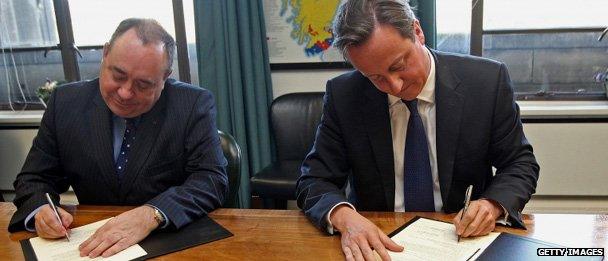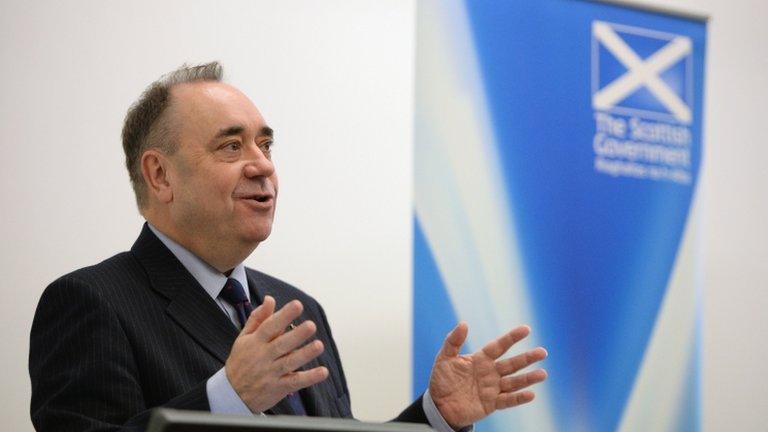What is the status of this White Paper?
- Published

The SNP sees the White Paper as a prospectus for independence
How was your weekend, ahead of this Big Week? Good? Mine? Rather splendid, thanks for asking, aided by yet another brilliant performance by the lads in Tangerine.
C'mon, these may be historic times - but I still reserve the right, whatever the competition, to vaunt the heroes of Tannadice. These days, their opponents don't just look beaten: they look scared.
Plus I took in the splendid Scottish Opera production of Don Giovanni. A tale of passion, intrigue, jealousy and revenge. Excellent preparation, as I noted on the wireless, for another immersion in Scottish politics.
The White Paper runs to 670 pages and will be published as a book. Will it be bedside reading? Will we see it peeping from travellers' rucksacks? Will it be devoured, poolside, on electronic reading devices?
Hope so. As do both sides in this remarkable campaign. Nicola Sturgeon, the deputy first minister, says the more folk learn about the detail of the independence offer, the more they like it.
Alistair Carmichael, the Scottish Secretary, says precisely the opposition. He says that the gaps in the independence prospectus will be evident.
More on that on Tuesday. Much more.
Assent or dissent
But here's an issue to get us going, in advance. One I've canvassed before. One, I suspect, which will emerge repeatedly. It is this. What is the status of this White Paper - or guide to independence?
Obvious? It is like any other White Paper: a statement of governmental intent. However, in Scottish constitutional politics, nothing is obvious, nothing is simple.
The Scottish government views the document as its prospectus on independence. More to the point, it argues that, in the referendum, the people of Scotland will be voting upon the detailed contents of that White Paper, offering assent or dissent.

Donald Dewar (right) was backed by Tony Blair over his 1997 devolution White Paper
SNP ministers cite as precedent the White Paper on devolved powers published by the then Scottish Secretary Donald Dewar ahead of the referendum on devolution on the 11th of September 1997. Voters were asked two questions: should there be a devolved Scottish Parliament; should it have tax varying powers?
Voters assented to both propositions - and Westminster duly responded by legislating for a Scottish Parliament, now established.
Crucially, the details of that legislation, the Scotland Act 1998, closely mirrored the content of the advance White Paper.
Donald Dewar faced obstacles in Cabinet from sceptical colleagues but was able to argue that his proposals, as set out in the White Paper, had a popular mandate.
Tony Blair broadly backed him on that view, while drawing certain "red lines" designed, as he saw it, to sustain the Union.
That White Paper was itself based upon the conclusions of the cross-party Constitutional Convention through which Labour and the Liberal Democrats, in opposition prior to 1997, had drafted a scheme of Scottish devolution.
Edinburgh Agreement
In short, the referendum of 1997 was regarded, intellectually and practically, as giving a mandate to the detailed contents of the UK government White Paper.
Alex Salmond argues that precisely the same would apply with his independence White Paper. He argues that, should independence receive popular assent in the referendum, he would be entitled to expect implementation of the detailed proposals in the White Paper - including the ones which require external co-operation.
So, to be specific, he would expect the UK government to work towards a sterling currency zone and to support Scottish membership of Nato and the EU. (One might note a possible bargaining counter: the timetable for the withdrawal of Trident from Scottish waters.)
Further, the first minister says such co-operation is specified in the Edinburgh Agreement which he signed with Prime Minister David Cameron.

The Edinburgh Agreement was signed by the leaders of the Scottish and UK governments
Clause 30 of that agreement states: "The two governments are committed to continue to work together constructively in the light of the outcome, whatever it is, in the best interests of the people of Scotland and of the rest of the United Kingdom."
Alex Salmond interprets that as meaning that the UK will adhere to the mandate which would arise from a Yes vote to independence.
You will not be surprised to learn that the UK government sees things rather differently.
Firstly, they say that Mr Salmond over-states the impact of Clause 30. They say that simply means that both sides would respect the outcome of the referendum, whatever it is. It does not imply that the UKG would roll over and implement whatever Mr Salmond wants.
Secondly, they query the status of the White Paper itself. They note that in 1997 Donald Dewar was publishing a White Paper on behalf of the UK government. That same UK Government then implemented that White Paper by enacting legislation through the UK parliament.
Assets and liabilities
Things, they argue, would be rather different this time around. It is a devolved Scottish government publishing a White Paper.
The issue of the constitution is reserved to Westminster. Even in the event of a Yes vote, there would be negotiations between Edinburgh and London to broker an independent settlement: the division of assets and liabilities etc.
Such a settlement would then require to be implemented, ultimately, through an Act of the Westminster Parliament. Not Holyrood.
This is a clear and significant difference of interpretation. Alex Salmond sees the White Paper as a prospectus. UK Ministers see it as a wish list.
Politically, however, it might be argued that, should the people of Scotland vote for independence, the momentum would lie with those advocating the contents of the White Paper, particularly as those contents will have been exhaustively examined and debated.
It is, however, germane to note the dispute.
It will be relevant in the referendum debate. Unionists will say - they are already saying - that Mr Salmond cannot, by himself, deliver what he is promising. Nationalists will say - they are already saying - that a popular mandate in the referendum would trump any Unionist objections.
- Published19 November 2013

- Published18 November 2013
